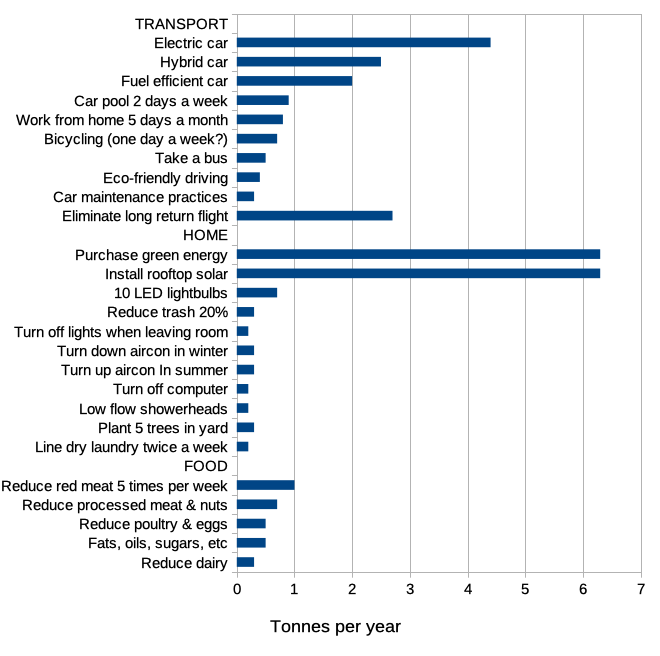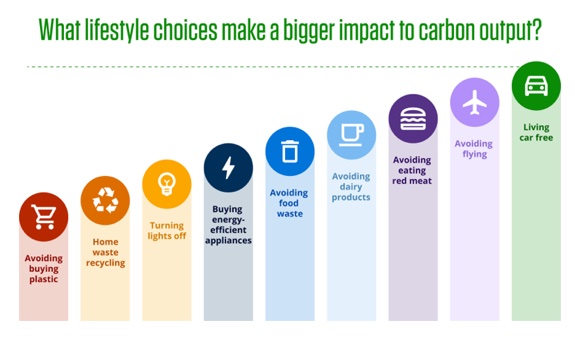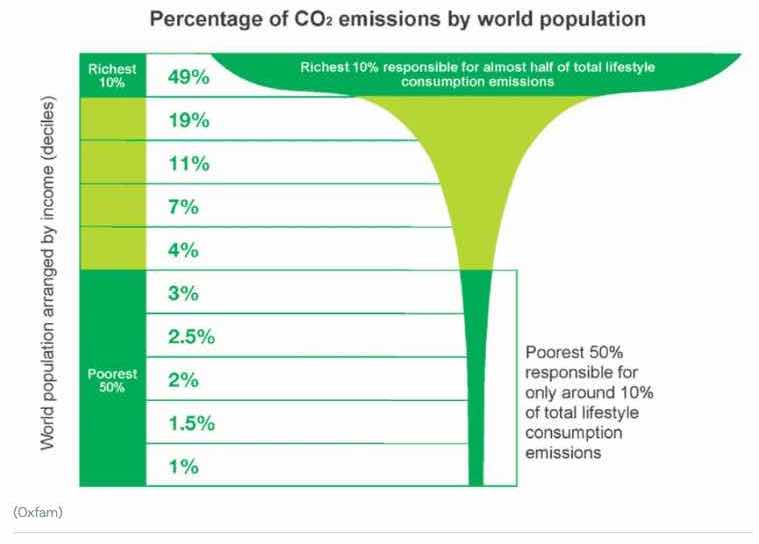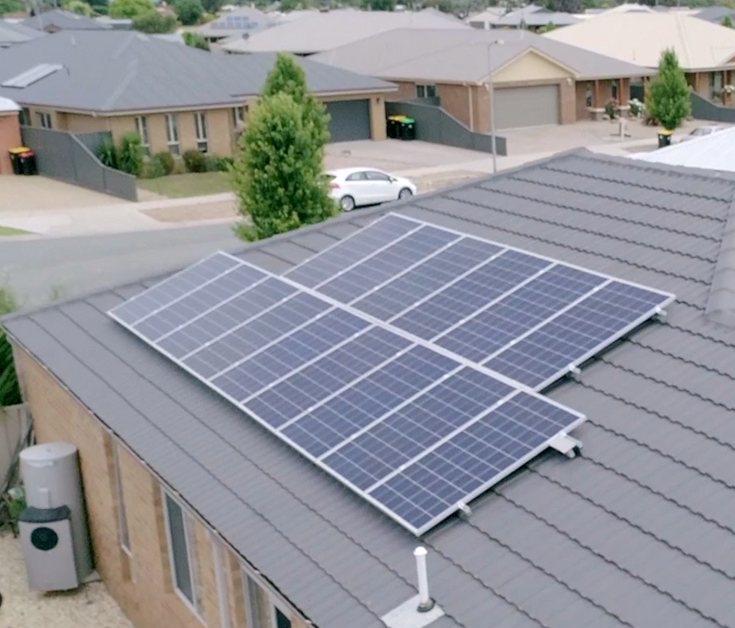The most important thing we can do to reduce the impacts of climate change is to vote for politicians who will take the necessary steps to move our economy to a low carbon future.
But we feel like we want to do more ourselves. So what can we do?
Eight important lifestyle changes
For each of us in the first world to play our part, we will have to reduce our emissions by somewhere between 5 tonnes per year to 16 tonnes per year (depending on where we live). Australians need to move from about 15 tonnes/ year per capita to about 2 tonnes/year.
The following 8 actions, starting with the most important, can make an enormous difference.
1. Vote for action
Governments which set emissions reductions targets, promote and subsidise renewable energy and electric vehicles, and leave coal in the ground are the single most important means of combating climate change.
2. Use wealth carefully
Rich and luxury lifestyles are especially harmful. Anyone in the first world has greater responsibility; the very rich even more so.
3. Limit family size
More controversial, but certainly impactful, slowing the population increase will always be beneficial. Adoption is one option worth considering.
4. Green transport
Use of electric cars (and anything other than private petrol driven cars), especially after electricity generation is renewable, and reducing air travel (plus purchasing carbon offsets) remain important choices. Cycling, walking, public transport and car-pooling are all helpful.
5. Domestic energy
Rooftop solar and/or purchasing green energy are important and should be considered by everyone who can afford it.
6. Food
Cattle generate greenhouse gases, so shifting our diet towards other forms of protein, or a plant-based diet, are things we can all do to a reasonable extent.
7. Consumption
All goods generate carbon emissions in manufacture and transport. Reducing consumption, especially of fashion items, is more important than we might think.
8. Do the small things
Many small changes can make a difference when added together. ThIngs like:
- use energy efficient light globes;
- set air conditioners to less power hungry levels;
- wash clothes in cold water;
- dry clothes on lines rather than in electric dryers;
- plant trees; and
- turn of power (lights, computers, appliacnes, etc) when not in use.
Read on to see the figures.
Different estimates
We all want to know how much different actions will reduce carbon emissions, and hence what are the most important actions. But it isn’t that simple.
The effectiveness of actions will depend on individual circumstances, including national or local energy sources. But we can get a good idea by checking out different estimates from different places.
All estimates of the savings of each action are in annual tonnes of CO2.
Lund University (Sweden, 2016)
A Lund University study found the following 5 lifestyle choices were the most important (estimates per person):
- Have one less child – very high impact (saving of 59 tonnes per year at present emissions levels, but could be as small as 4 if emission levels are reduced as required).
- Live car free – 2.4 tonnes.
- Avoid 1 round trip transatlantic flight – 1.6 tonnes.
- Plant-based diet – 0.8 tonnes.
- Buy green energy – may be small impact but may save up to 1.5 tonnes p.a.
A bunch of other actions had lower impacts (in descending order):
• Replace petrol/diesel care with hybrid.
• Wash clothes in cold water.
• Recycle.
• Use clothes line rather than washer to dry clothes.
• Upgrade light bulbs.
Coolclimate, Uni of California (US, 2020)
These estimates of savings are tonnes per year for a US family (not per person).

Founders Pledge (Global, 2020)
This charitable organisation seems to use the Lund University study but comes up with some of its own conclusions. The annual world average per capita emissions are about 5 tonnes, with first world countries being up to 3.5 times higher. To achieve net zero emissions, we need to get the global average down to about 1.5 – 2 tonnes (the rest can be removed or sequestered).
Founders Pledge also notes that if governments have strong climate policies, some individual actions (e.g. not having children or purchasing green power) are less important. Its assessment includes the following actions and per annum emissions savings:
- Children (4 tonnes) – because of improving government policy, having a child is less of an impact than has been claimed.
- Electric cars (1-2 tonnes depending on country) – manufacturing impacts indicate owning as few cars as possible.
- Air travel (0-6 tonnes, depending on number of flights and country) – first class and business class result in greater emissions; where carbon offsets are rpurchased, the impacts are much reduced.
- Green electricity (0-3 tonnes) – in many advanced economies, electricity generation emissions are already capped, so buying green achieves little, but elsewhere this can be important.
- Domestic heating (0-2.5 tonnes) – depends on source of heating (gas has higher emissions). Savings can be made with better housing insulation.
- Plant-based diet (0.4 tonnes).
- Donations & offsets – donating to a climate charity may be a more effective use of personal resources than many other actions.
Tech Invest (Australia, 2021)
This Australian magazine suggests four important lifestyle choices:
- Switch to electric vehicle – but this will only work if we …..
- Switch to green energy – either home solar or a green energy provider.
- Avoid fast fashion – clear clothing waste is an environmental problem, but apparently the fashion industry also contributes 10% of global carbon emissions.
- Eat more sustainably – intensively farmed livestock are a significant source of greenhouse gases.
Financial Times (UK, 2022)
The Financial Times suggests 5 actions:
- Reduce meat eating and dairy. Beef contributes 8-10 times more carbon than fish, poultry or eggs.
- Avoid fast fashion and buy less.
- Reduce overseas holidays and so reduce air travel.
- Move from petrol car to electric car – though this will depend on whether recharging from renewable energy.
- Bitcoin “mining” apparently use significant amounts of energy. Other cryptocurrency may be better.
Unknown source

Reasons to be cautious
There are however many reasons to be cautious about using these figures.
Government action is king
Government action (subsidising & support renewable power generation and vehicles, setting emissions limits, emissions trading schemes, etc) remains by far the most important way to combat climate change. If governments were deeply proactive, many individual choices would be simpler or unnecessary.
Wealth is critical
More than anything else, being wealthy is probably the main determinant of carbon impact.
- Wealthy countries in North America and Europe contribute well above the world average consumption-based emissions per capita.
- The most wealthy 10% of the world contributes 50% of emissions while the least wealthy 50% contributes 10% of emissions (see graphic).
- The lifestyles of the super wealthy (private jets, expensive yachts, expensive power-hungry homes, frequent travel and opulent lifestyles) are particularly harmful.

Don’t start a war!
Everything changes in warfare. Excessive energy use, destruction of buildings, infrastructure, vehicles and weapons that later have to be replaced, all have climate impacts. (Not to mention the terrible loss of life!) Putin’s war in Ukraine is costing the world in many ways, and climate is just one of them.
It’s complex
Where we live, how we live, different choices, variations in estimates and changes in policies all make estimates very approximate.
Nevertheless, the overall picture is clear, and the actions at the top of the page are broadly helpful. It’s up to all of us!
Photo: Rooftop solar panels, courtesy of Climate Council (Australia).
